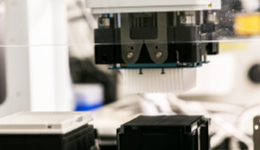-
University Guide
 University Guide
University Guide
INDEX- Introducing the President
- University Introduction
- University Evaluation
-
Policies and Initiatives
- Policy and Initiatives INDEX
- Compliance
- Crisis Management System
- Promoting gender equality
- International Exchange Policy
- Infrastructure longevity plan (individual construction plan)
- Environmental Initiatives
- Smoking is prohibited throughout the university grounds.
- Safety Management Action Plan
- JABEE Initiatives
- Basic rules regarding drinking among Muroran Institute of Technology students
- Policy for promoting the sharing of research facilities and equipment at Muroran Institute of Technology
- Campus Master Plan
- Muroran Institute of Technology Conflict of Interest Management Policy
- Digital Campus Promotion
- Muroran Institute of Technology Open Access Policy
- Muroran Institute of Technology Research Data Policy
-
Information Disclosure
- Information Disclosure INDEX
- Disclosure of corporate information (information about the organization)
- Disclosure of corporate information (information regarding business)
- Disclosure of corporate information (financial information)
- Publication of corporate information (evaluation information)
- Disclosure of corporate information (audit information)
- Publication of educational information
- Compliance status with the National University Corporation Governance Code
- Rules
- Information Disclosure System
- Personal Information Protection System
- Publication of guidelines for employees regarding the promotion of the elimination of discrimination against people with disabilities
- Announcement of the New Support System for Higher Education
- Application and recruitment information
- public relations
-
Faculty/Graduate School/Center etc.
 Faculty/Graduate School/Center etc.
Faculty/Graduate School/Center etc.
INDEX- Faculty of Science and Engineering
- graduate school
-
Affiliated facilities (centers, etc.)
- Affiliated Facilities (Centers, etc.) INDEX
- Creative Collaboration Center
- Aerospace Plane Research Center
- Rare Earth Materials Research Center
- Computer Science Center
- Research Infrastructure Equipment Sharing Center
- Technology Department
- Career Support Center
- International Exchange Center
- Information Education Center
- Affiliated Library
- Health Management Center
- Gender Equality Promotion Office
- MONO Creation Future Co-Creation Organization
- Regional Collaboration Human Resources Development Center
- Manufacturing Infrastructure Center
- Robot Arena
- satellite
- Tokyo Office
- the study
-
Student Life/Employment
 Student Life/Employment
Student Life/Employment
INDEX-
Courses and classes
- Course/Class INDEX
- Academic Calendar
- Lesson plan (syllabus)
- Classes (timetable)
- Exam (timetable)
- Course Affiliation
- Credit transfer with other universities
- Re-reading of course subjects
- CAMPUS SQUARE (Course registration)
- How to take the course
- Student Handbook/Graduate School Course Guidelines
- Transfer of departments, etc.
- Doctoral Degree Application Guide
- Academic Counseling and Guidance
- Duration of study
- Long-term student system
- Educational Programs (not required for graduation or completion)
- A Note About Generative AI
-
Student Life
- Student Life INDEX
- Suspension and Absence
- Various notification and certificate issuance procedures
- Student ID and student number
- Student discount card/school attendance certificate
- Procedures for taking a leave of absence, reinstating, and withdrawing from school
- New academic year orientation
- Preserving the on-site environment
- Attention students
- Transportation on and off campus
- Message board/contact method
- Harassment
- health care
- Events
- Welfare facilities
- Student Dormitory
- Student Support Center Introduction
- Student General Advice Office
- Extracurricular Activities
- Tuition, scholarships and other procedures
- Employment and qualification support
-
Courses and classes
-
Entrance Examination Information
 Entrance Examination Information
Entrance Examination Information
INDEX- University Entrance Examination [Faculty]
- Graduate School Entrance Examination
- Transfer Admissions
- Entrance examination for international students
- Specialized students and research students
- Admission procedures, tuition fees, etc.
- FAQ
- University Introduction
- Request information

-
Social Cooperation
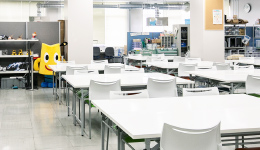 Social Cooperation
Social Cooperation
INDEX- Collaborative News
- Collaboration Centers, etc.
-
Industry-academia-government collaboration
- Industry-academia-government collaboration INDEX
- Alliance Lab
- Research Collaboration Association
- Muro Institute of Technology venture title
- Confidentiality
- Joint Research System
- Commissioned Research System
- Academic Guidance System
- Tangible research results
- Scholarship and Donation System
- Donation field etc.
- Future Creation Promotion Expenses
- Regarding the expenditure of personnel expenses of the principal investigator (PI) from direct costs of competitive research grants
- Research ethics and safety
- Public Lectures
- Muro Institute of Technology Science School
- University Visit
- Robot Soccer Contest
- Re-education for working adults
-
International Exchange
 International Exchange
International Exchange
INDEX- International Academic Exchange Agreements
- Number of international students
- Researcher Database
- Entrance Exam
- Tuition Fees
- International Student Support (for new students)
-
Support for international students (for current students)
- Scholarships for International Students
- Japanese Language Course for International Students
- Immigration procedures (renewal of period of stay, permission to engage in activities other than those permitted under the status of residence, re-entry permission)
- Procedures after arriving in Japan
- Procedures for changing address (under construction)
- Procedures upon returning to Japan
- Notification of absence due to temporary return to Japan, travel, etc.
- Employment for international students
- Emergency Contact Information
- Studying abroad from Muro Institute of Technology
- Request for donations
-
University Guide
University Guide INDEX
- Introducing the President
- University Introduction
- University Evaluation
-
Policies and Initiatives
- Policy and Initiatives INDEX
- Compliance
- Crisis Management System
- Promoting gender equality
- International Exchange Policy
- Infrastructure longevity plan (individual construction plan)
- Environmental Initiatives
- Smoking is prohibited throughout the university grounds.
- Safety Management Action Plan
- JABEE Initiatives
- Basic rules regarding drinking among Muroran Institute of Technology students
- Policy for promoting the sharing of research facilities and equipment at Muroran Institute of Technology
- Campus Master Plan
- Muroran Institute of Technology Conflict of Interest Management Policy
- Digital Campus Promotion
- Muroran Institute of Technology Open Access Policy
- Muroran Institute of Technology Research Data Policy
-
Information Disclosure
- Information Disclosure INDEX
- Disclosure of corporate information (information about the organization)
- Disclosure of corporate information (information regarding business)
- Disclosure of corporate information (financial information)
- Publication of corporate information (evaluation information)
- Disclosure of corporate information (audit information)
- Publication of educational information
- Compliance status with the National University Corporation Governance Code
- Rules
- Information Disclosure System
- Personal Information Protection System
- Publication of guidelines for employees regarding the promotion of the elimination of discrimination against people with disabilities
- Announcement of the New Support System for Higher Education
- Application and recruitment information
- public relations
-
Faculty/Graduate School/Center etc.
Faculty/Graduate School/Center etc. INDEX
- Faculty of Science and Engineering
- graduate school
-
Affiliated facilities (centers, etc.)
- Affiliated Facilities (Centers, etc.) INDEX
- Creative Collaboration Center
- Aerospace Plane Research Center
- Rare Earth Materials Research Center
- Computer Science Center
- Research Infrastructure Equipment Sharing Center
- Technology Department
- Career Support Center
- International Exchange Center
- Information Education Center
- Affiliated Library
- Health Management Center
- Gender Equality Promotion Office
- MONO Creation Future Co-Creation Organization
- Regional Collaboration Human Resources Development Center
- Manufacturing Infrastructure Center
- Robot Arena
- satellite
- Tokyo Office
- the study
-
Student Life/Employment
Student Life/Employment INDEX
-
Courses and classes
- Course/Class INDEX
- Academic Calendar
- Lesson plan (syllabus)
- Classes (timetable)
- Exam (timetable)
- Course Affiliation
- Credit transfer with other universities
- Re-reading of course subjects
- CAMPUS SQUARE (Course registration)
- How to take the course
- Student Handbook/Graduate School Course Guidelines
- Transfer of departments, etc.
- Doctoral Degree Application Guide
- Academic Counseling and Guidance
- Duration of study
- Long-term student system
- Educational Programs (not required for graduation or completion)
- A Note About Generative AI
-
Student Life
- Student Life INDEX
- Suspension and Absence
- Various notification and certificate issuance procedures
- Student ID and student number
- Student discount card/school attendance certificate
- Procedures for taking a leave of absence, reinstating, and withdrawing from school
- New academic year orientation
- Preserving the on-site environment
- Attention students
- Transportation on and off campus
- Message board/contact method
- Harassment
- health care
- Events
- Welfare facilities
- Student Dormitory
- Student Support Center Introduction
- Student General Advice Office
- Extracurricular Activities
- Tuition, scholarships and other procedures
- Employment and qualification support
-
Courses and classes
- Entrance Examination Information
-
Social Cooperation
Social Collaboration INDEX
- Collaborative News
- Collaboration Centers, etc.
-
Industry-academia-government collaboration
- Industry-academia-government collaboration INDEX
- Alliance Lab
- Research Collaboration Association
- Muro Institute of Technology venture title
- Confidentiality
- Joint Research System
- Commissioned Research System
- Academic Guidance System
- Tangible research results
- Scholarship and Donation System
- Donation field etc.
- Future Creation Promotion Expenses
- Regarding the expenditure of personnel expenses of the principal investigator (PI) from direct costs of competitive research grants
- Research ethics and safety
- Public Lectures
- Muro Institute of Technology Science School
- University Visit
- Robot Soccer Contest
- Re-education for working adults
-
International Exchange
International Exchange Index
- International Academic Exchange Agreements
- Number of international students
- Researcher Database
- Entrance Exam
- Tuition Fees
- International Student Support (for new students)
-
Support for international students (for current students)
- Scholarships for International Students
- Japanese Language Course for International Students
- Immigration procedures (renewal of period of stay, permission to engage in activities other than those permitted under the status of residence, re-entry permission)
- Procedures after arriving in Japan
- Procedures for changing address (under construction)
- Procedures upon returning to Japan
- Notification of absence due to temporary return to Japan, travel, etc.
- Employment for international students
- Emergency Contact Information
- Studying abroad from Muro Institute of Technology
- Request for donations
- HOME
- Faculty/Graduate School/Center etc.
- Faculty of Science and Engineering
- Department of System Science and Chemistry
- Physical and Material Systems Course
Physical and Material Systems Course
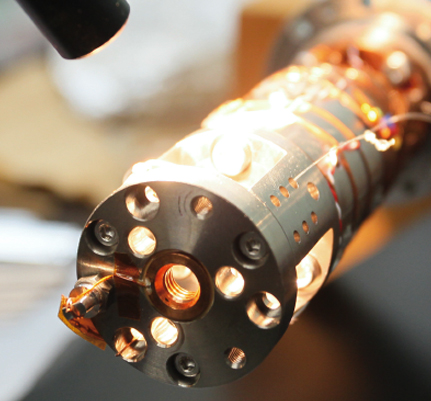
I want to create new substances! I want to learn technologies that are beneficial to the environment!
We conduct education and research that combines the science field of physics and material science, which explores everything from the truths and laws of nature to the essence of familiar materials and substances, with informatics (the science and engineering of information), which provides the means to extract and utilize data related to essences.
About the Education Program
Learn physics from the basics and explore how to use it
From the first year to the first half of the second year, students take general education courses, college and department-wide (natural science) courses, and some information-related courses to acquire communication skills and social literacy, as well as a wide range of knowledge about natural sciences (mathematics, physics, chemistry, biology) and basic knowledge about information science. From the second half of the second year onwards, students in this course systematically take courses in each field, divided into physics and mathematics, mechanics, electromagnetism, thermal and statistical mechanics, quantum physics, material science, and materials science, in order to apply physics, which describes the truths and laws of the natural world, to substances, materials, and materials. In addition, students will use the knowledge they have acquired in information-related courses in specialized courses and learn how to apply it to practical information methods.
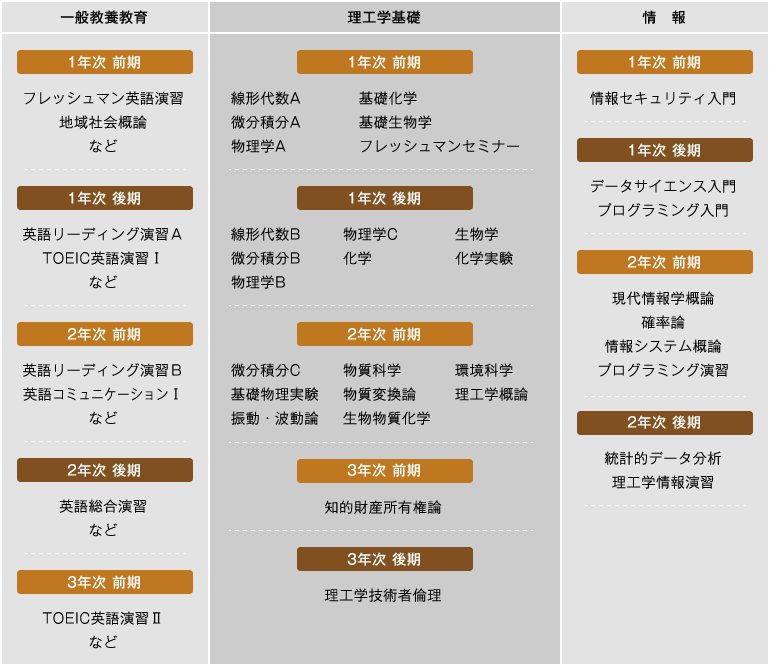
Physical and Material Systems Course
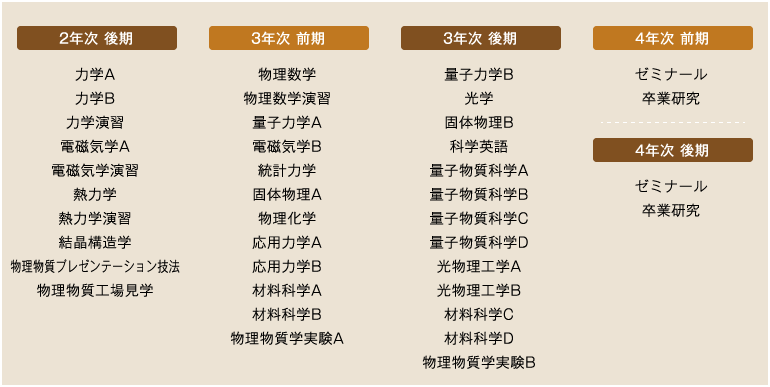
Flow of the four years
First year
General education subjects include subjects related to people and society, foreign languages, regional collaboration subjects, common natural science subjects including mathematics, physics, chemistry, and biology, and information-related subjects including information security, data science, and programming.
Second Year
Students will learn about natural sciences across disciplines through subjects such as "Material Transformation Theory," "Biomaterial Chemistry," "Vibration and Wave Theory," and "Material Science," and will also learn about information science through subjects such as "Introduction to Modern Informatics," "Probability Theory," "Statistical Data Analysis," and "Introduction to Information Systems." From the second semester, students will begin taking specialized subjects in each course.
Third Year
Continuing from the second semester of the second year, students will study specialized course subjects. Students will take subjects such as "quantum mechanics," "electromagnetism," "statistical mechanics," "solid state physics," "optical physics engineering," "quantum material science," and "materials science" to acquire a wide range of specialized knowledge related to the field, and will also conduct experiments and exercises using computers to integrate and utilize this knowledge.
Fourth Year
The main part of learning in the fourth year is practical, through graduation research. By applying the knowledge acquired up to that point to problems set in each field, students will make their knowledge more essential and develop their problem-solving skills.
Physical and Material Systems Course Pickup
About the classes
Solid State Physics A
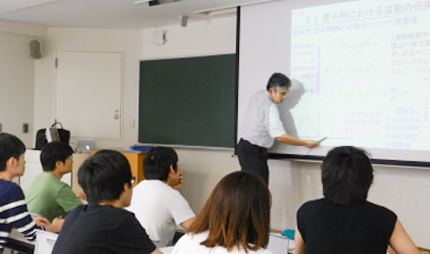
This is an important field of study for understanding various functional materials that are essential in our high-tech society, and students learn about the bonding patterns of atoms in crystals, methods for analyzing atomic arrangements using X-rays, and the propagation of lattice (atomic) vibrations. In "Solid State Physics B," which builds on this foundation, students further utilize basic physics, quantum mechanics, and statistical mechanics to understand the behavior of electrons in crystals, and develop this into the specifics of functional materials in "Materials Science" and "Quantum Matter Science."
About the Research
Development and elucidation of the physical properties of strongly correlated amorphous alloys - Creating unknown alloys that will amaze the world -
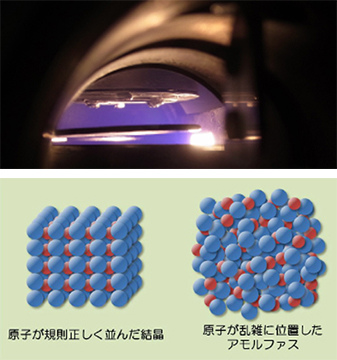
"Strong correlation" refers to a system in which electrons and other particles in a substance interact strongly with each other.
Representative phenomena of strongly correlated states include superconductivity, heavy fermion states, and giant magnetoresistance.
These phenomena are expected to bring about a revolution in energy and electronics materials. In order to pursue unique research, our laboratory focuses on amorphous alloys, whose constituent atoms have a random structure, and is developing "strongly correlated amorphous alloys," which have hardly been studied anywhere in the world. We aim to elucidate the superconducting phenomena and heavy electron states realized in strongly correlated amorphous alloys, and develop next-generation energy and electronics materials.
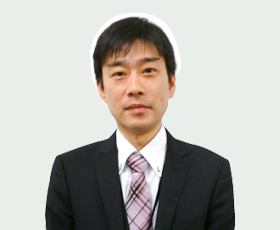
Associate Professor Yusuke Amami
Research Field
Strong correlation properties
Main research themes
- Development of new rare earth amorphous alloys exhibiting heavy fermion and superconducting properties
- Clarification of the phenomenon of giant thermal expansion in manganese-based amorphous alloys
- Synthesis of intermetallic compounds aimed at the development of new materials that exhibit unique magnetic or thermal properties
Licenses and qualifications available
driver licence
- High school teacher's license (science), etc. *Teacher training course credits required
Qualifications
- Assistant Engineer, etc.
Employment situation
- Assist Hokkaido
- Alps Alpine
- Isuzu Motors
- NTT Facilities Hokkaido
- H.I.D.
- Nippon Steel Corporation
- Dynax
- Toshiba
- Toyota Motor Hokkaido
- Narazaki Manufacturing Co., Ltd.
- Nippon Steel Cement
- IBM Japan Solution Services
- Nippon Chemi-Con
- Japan Nuclear Fuel
- Japan Steel Works
- Hamamatsu Photonics
- Hitachi Construction Machinery
- Fujitsu Semiconductor
- Fuji Electric
- Furukawa Electric
- Hokkaido Electric Power
- Mitsubishi Motors Engineering
- MinebeaMitsumi
- Meidensha
- Snow Brand Megmilk
- Ministry of Economy, Trade and Industry
- Ministry of Land, Infrastructure, Transport and Tourism
- Japan Atomic Energy Agency (JAEA)
- Hokkaido Prefectural Government
- Hakodate City Hall, etc.

